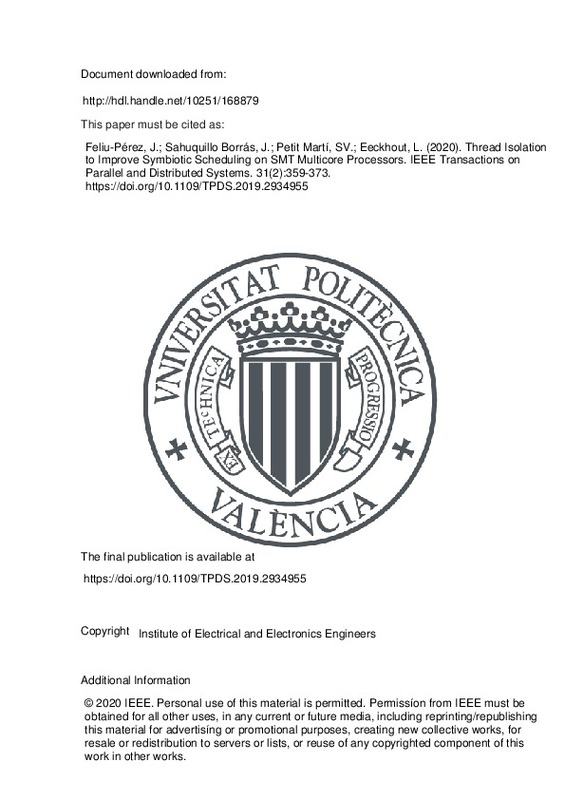JavaScript is disabled for your browser. Some features of this site may not work without it.
Buscar en RiuNet
Listar
Mi cuenta
Estadísticas
Ayuda RiuNet
Admin. UPV
Thread Isolation to Improve Symbiotic Scheduling on SMT Multicore Processors
Mostrar el registro sencillo del ítem
Ficheros en el ítem
| dc.contributor.author | Feliu-Pérez, Josué
|
es_ES |
| dc.contributor.author | Sahuquillo Borrás, Julio
|
es_ES |
| dc.contributor.author | Petit Martí, Salvador Vicente
|
es_ES |
| dc.contributor.author | Eeckhout, Lieven
|
es_ES |
| dc.date.accessioned | 2021-07-07T03:31:10Z | |
| dc.date.available | 2021-07-07T03:31:10Z | |
| dc.date.issued | 2020-02-01 | es_ES |
| dc.identifier.issn | 1045-9219 | es_ES |
| dc.identifier.uri | http://hdl.handle.net/10251/168879 | |
| dc.description | © 2020 IEEE. Personal use of this material is permitted. Permissíon from IEEE must be obtained for all other uses, in any current or future media, including reprinting/republishing this material for advertisíng or promotional purposes, creating new collective works, for resale or redistribution to servers or lists, or reuse of any copyrighted component of this work in other works. | es_ES |
| dc.description.abstract | [EN] Resource sharing is a critical issue in simultaneous multithreading (SMT) processors as threads running simultaneously on an SMT core compete for shared resources. Symbiotic job scheduling, which co-schedules applications with complementary resource demands, is an effective solution to maximize hardware utilization and improve overall system performance. However, symbiotic job scheduling typically distributes threads evenly among cores, i.e., all cores get assigned the same number of threads, which we find to lead to sub-optimal performance. In this paper, we show that asymmetric schedules (i.e., schedules that assign a different number of threads to each SMT core) can significantly improve performance compared to symmetric schedules. To leverage this finding, we propose thread isolation, a technique that turns symmetric schedules into asymmetric ones yielding higher overall system performance. Thread isolation identifies SMT-adverse applications and schedules them in isolation on a dedicated core to mitigate their sharp performance degradation under SMT. Our experimental results on an IBM POWER8 processor show that thread isolation improves system throughput by up to 5.5 percent compared to a state-of-the-art symmetric symbiotic job scheduler. | es_ES |
| dc.description.sponsorship | Josue Feliu has been partially supported through a postdoctoral fellowship by the Generalitat Valenciana (APOSTD/2017/052). Additional support has been provided by the Ministerio de Ciencia, Innovacion y Universidades and the European ERDF under Grant RTI2018-098156-B-C51, as well as, by the Universitat Politenica de Valencia through the "Ayudas a Primeros Proyectos de Investigacion" (PAID-06-18) under grant SP20180140. Lieven Eeckhout's research program is supported through FWO grants no. G.0434.16N and G.0144.17N, and the European Research Council (ERC) Advanced Grant agreement no. 741097. | es_ES |
| dc.language | Inglés | es_ES |
| dc.publisher | Institute of Electrical and Electronics Engineers | es_ES |
| dc.relation.ispartof | IEEE Transactions on Parallel and Distributed Systems | es_ES |
| dc.rights | Reserva de todos los derechos | es_ES |
| dc.subject | Schedules | es_ES |
| dc.subject | Message systems | es_ES |
| dc.subject | Symbiosis | es_ES |
| dc.subject | Program processors | es_ES |
| dc.subject | Degradation | es_ES |
| dc.subject | Resource management | es_ES |
| dc.subject | Throughput | es_ES |
| dc.subject | Simultaneous multithreading (SMT) | es_ES |
| dc.subject | Symbiotic job scheduling | es_ES |
| dc.subject | Thread isolation | es_ES |
| dc.subject.classification | ARQUITECTURA Y TECNOLOGIA DE COMPUTADORES | es_ES |
| dc.title | Thread Isolation to Improve Symbiotic Scheduling on SMT Multicore Processors | es_ES |
| dc.type | Artículo | es_ES |
| dc.identifier.doi | 10.1109/TPDS.2019.2934955 | es_ES |
| dc.relation.projectID | info:eu-repo/grantAgreement/EC/H2020/741097/EU/Load Slice Core: A Power and Cost-Efficient Microarchitecture for the Future/ | es_ES |
| dc.relation.projectID | info:eu-repo/grantAgreement/UPV//SP20180140/ | es_ES |
| dc.relation.projectID | info:eu-repo/grantAgreement/UPV//PAID-06-18/ | es_ES |
| dc.relation.projectID | info:eu-repo/grantAgreement/AEI/Plan Estatal de Investigación Científica y Técnica y de Innovación 2017-2020/RTI2018-098156-B-C51/ES/TECNOLOGIAS INNOVADORAS DE PROCESADORES, ACELERADORES Y REDES, PARA CENTROS DE DATOS Y COMPUTACION DE ALTAS PRESTACIONES/ | es_ES |
| dc.relation.projectID | info:eu-repo/grantAgreement/FWO//G.0434.16N/ | es_ES |
| dc.relation.projectID | info:eu-repo/grantAgreement/FWO//G.0144.17N/ | es_ES |
| dc.relation.projectID | info:eu-repo/grantAgreement/GVA//APOSTD%2F2017%2F052/ | es_ES |
| dc.rights.accessRights | Abierto | es_ES |
| dc.contributor.affiliation | Universitat Politècnica de València. Departamento de Informática de Sistemas y Computadores - Departament d'Informàtica de Sistemes i Computadors | es_ES |
| dc.description.bibliographicCitation | Feliu-Pérez, J.; Sahuquillo Borrás, J.; Petit Martí, SV.; Eeckhout, L. (2020). Thread Isolation to Improve Symbiotic Scheduling on SMT Multicore Processors. IEEE Transactions on Parallel and Distributed Systems. 31(2):359-373. https://doi.org/10.1109/TPDS.2019.2934955 | es_ES |
| dc.description.accrualMethod | S | es_ES |
| dc.relation.publisherversion | https://doi.org/10.1109/TPDS.2019.2934955 | es_ES |
| dc.description.upvformatpinicio | 359 | es_ES |
| dc.description.upvformatpfin | 373 | es_ES |
| dc.type.version | info:eu-repo/semantics/publishedVersion | es_ES |
| dc.description.volume | 31 | es_ES |
| dc.description.issue | 2 | es_ES |
| dc.relation.pasarela | S\404913 | es_ES |
| dc.contributor.funder | European Commission | es_ES |
| dc.contributor.funder | Generalitat Valenciana | es_ES |
| dc.contributor.funder | Research Foundation Flanders | es_ES |
| dc.contributor.funder | Agencia Estatal de Investigación | es_ES |
| dc.contributor.funder | European Regional Development Fund | es_ES |
| dc.contributor.funder | Universitat Politècnica de València | es_ES |







![[Cerrado]](/themes/UPV/images/candado.png)

